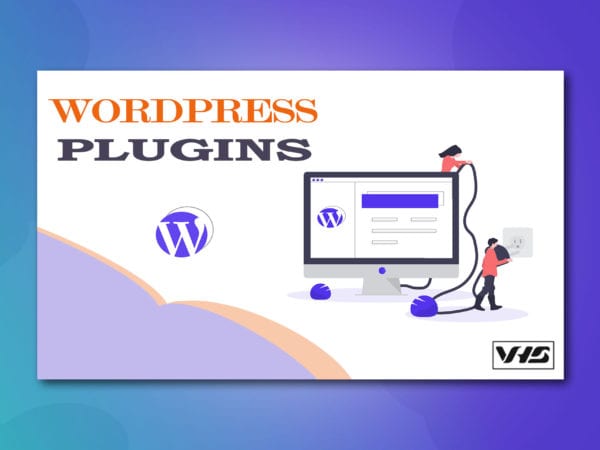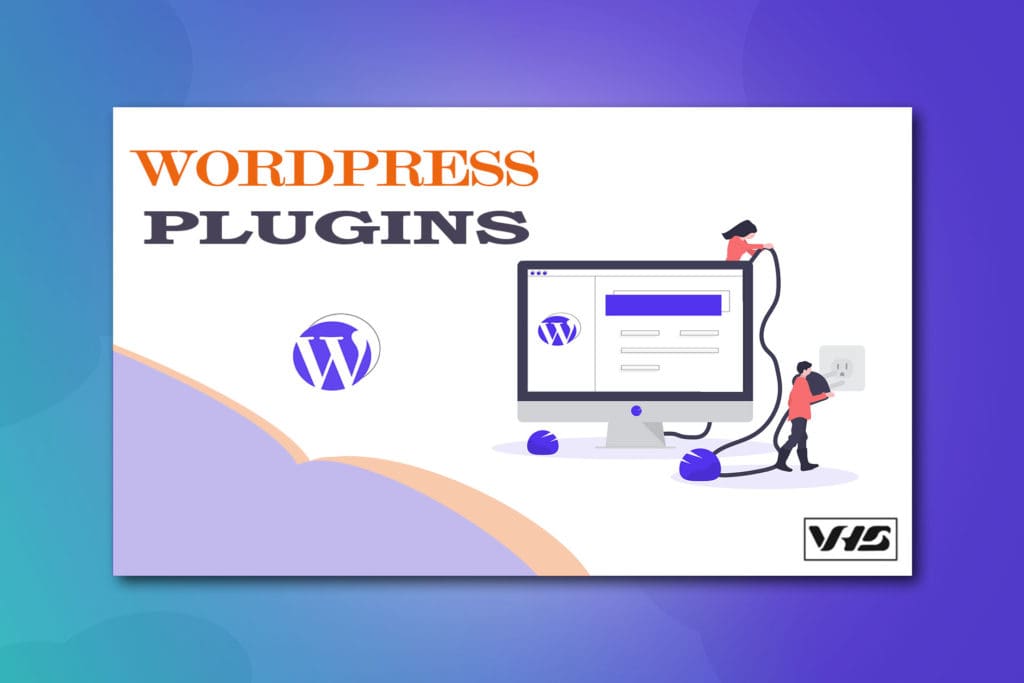
WordPress Plugins are a small program that customizes and enhances a WordPress website. Plugins are one of the greatest benefits of the WordPress platform. Most noteworthy functionalities include increasing web security, easy SEO implementation, and adding a storefront functionality into your site.
In this article, I will answer one of the basic questions about WordPress. First of all, what is a WordPress plugin? Furthermore, I’ll give you some tips on where to find WordPress plugins and how to manage them.
When To Use a WordPress Plugin?
Adding extra functionalities to your website has been a time-consuming project. WordPress plugins have completely simplified this process. A plugin can change everything from the smallest change in your website to massive modifications of the site functionalities. For example, a single plugin can even turn your WordPress website into a fully functioning learning platform, a social network, or even a powerful eCommerce store.
These Plugins are designed to solve specific problems or also it can provide an essential function to the site. There is some WordPress plugins design to work seamlessly with your site that doesn’t even have a user interface. For example, there are simple cache plugins that improve your site’s performance and consequently helping your website SEO.
Because the vast majority of plugins provide you with a free version. It’s important to understand that free usually don’t come with free tech support. Mainly, for this reason, a pay Pro version of the software is offered in order to keep the software up-to-date.
Why Pay For A WordPress Plugin?
Many of the free plugins have a vibrant community of developers trying to make it do the best job. On the other hand, there are some others backed by professional WordPress businesses. Companies that don’t want their names associated with a broken plugin, therefore, investing in the quality of the product becomes a priority.
While there are thousands of professional-looking plugins available for free in the WordPress plugin directory. There are alternative paid plugins that might offer you an additional set of functionalities to your site. Another benefit of a paid plugin is the full-time support staff that works on maintaining the security and compatibility of plugins.
Just because you are paying for a WordPress plugin, it doesn’t mean that is better than a free alternative. When you pay for a WordPress plugin, you are mainly financing for product support and some additional functionalities.
What is a WordPress Plugin?
A WordPress plugin is a small program that customizes and enhances a WordPress website. These plugins are written in the PHP programming language. Hence, design to integrate seamlessly with WordPress.
Popular Plugins & Functionalities
According to WordPress, these are some of the most popular plugins from the WordPress Plugin Directory:
Spam control
SEO
Data import and export
This is just a small intro to the thousands of plugins available and ready to be used. so there’s a good chance you’ll find some that are useful to you.
How To Install WordPress Plugins?
Plugins are great, the now the question is how to install them? There are a few ways to perform this action. The fastest way to find and install a WordPress plugin is by going into the Plugins Link in your side menu of your WordPress Admin Panel.
- Click on Plugins » Add New
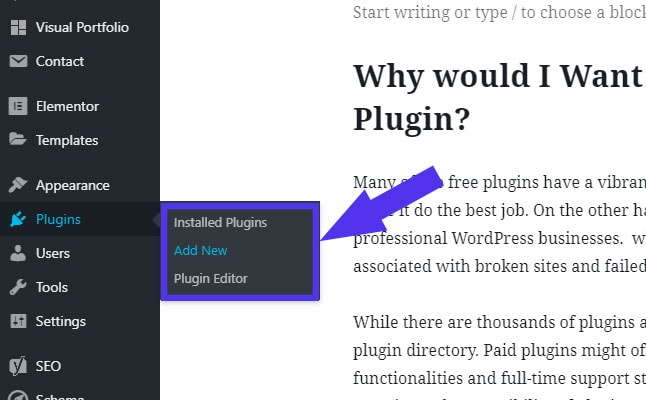
- Search for the plugin you need.
- Then click Install Now button
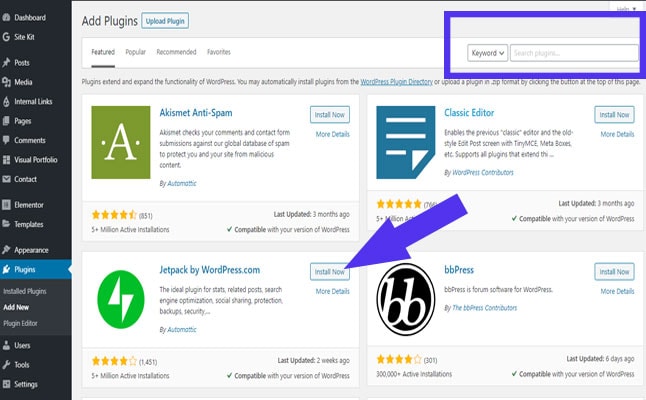
- Click the Activate button
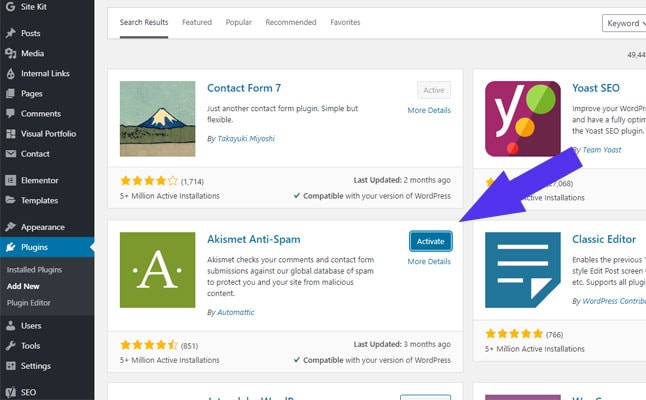
- To configure your new plugin go to the settings page in the left side menu bar and select your newly installed plugin.
How to Install WordPress Plugins Manually
There is an alternative way to install your plugin into the WordPress platform. Most of the popular plugins in the world offer a free and simple version of their plugin in the WordPress plugin directory but there are some plugins that are not offered in the WordPress plugins repository. There are three common sites where you can find plugins on the internet:
- WordPress.org the official WordPress plugin directory. In this platform, every single plugin must provide a free version of the plugin. This is typically a less customizable version of the plugin.
- Code Canyon is a popular marketplace for premium WordPress plugins that lists exclusively premium plugins.
- Direct from developers – some developers only sell their plugins on their own website.
If you want to use a plugin you found in a third marketplace or outside WordPress plugin directory, here is how you can install it on your new website.
- On the left-top corner of the plugin page click the Upload Plugin button
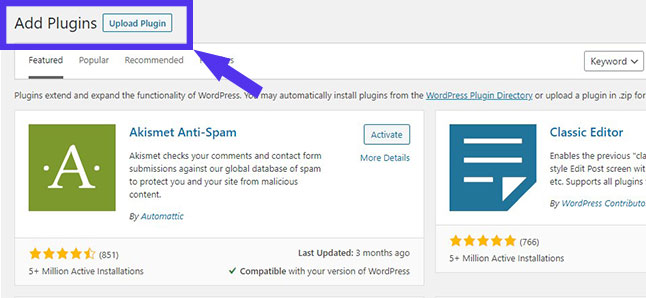
- Choose your plugin zip folder
- Click Install Now
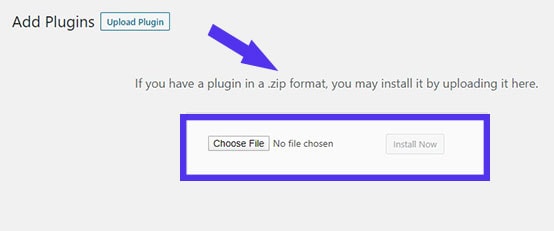
How to Update Your Plugin
Plugin developers usually update their plugins in order to add extra functionalities or most importantly to patch security vulnerabilities. For plugin installed from the WordPress plugin directory, updates will be visible to you on your site’s Plugins page. To find any plugins installed on your site that need to be updated:
- Click the Plugins link in the left nav of your site’s dashboard.
- Find the installed plugins that include a line reading “There is a new version available”
- You can check update details by clicking the “View version” link.
- Finally, click the “update now” link to update the plugin.
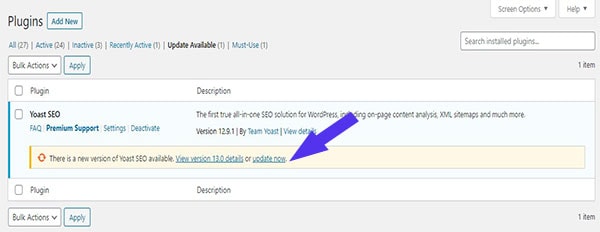
How to Deactivate a WordPress Plugin
- In the left-hand side menu, click Plugins.
- Locate the plugin you want to disable, and then click Deactivate. To re-enable the plugin, click Activate again.
The process is simple and can be done entirely from within your WordPress Plugin Directory.
The Bottom Line
As we all know, WordPress is a free and open-source platform supported by its communities around the world. This community is responsible for updating and finding vulnerabilities in WordPress plugins in order to keep WordPress updated and secure. Installing plugins that are kept up to date is the key to keeping your website away from common cyber attacks.

